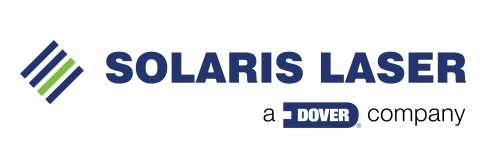Solaris Laser CO2 Laser Machines
For unparalleled precision and marking quality on a wide variety of substrates.
With more than 30 years of experience, the Solaris CO2 laser machine series offers precision and permanence across a multitude of industries and applications. Their sharp, clear, and highly legible marks are perfect for producing barcodes and all types of 2D code, including QR codes and the GS1 Digital Link , as well as batch numbers, expiration dates, and other crucial information.
- Excel at intricate designs and small-scale scannable markings
- Ink-free technology for reduced environmental impact
- Versatility across a wide range of substrates
- Ideal for high-speed production lines
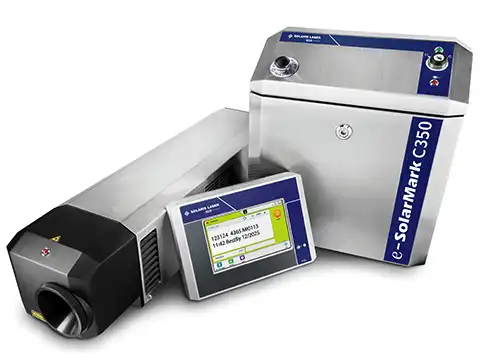
e-SolarMark C150/C350
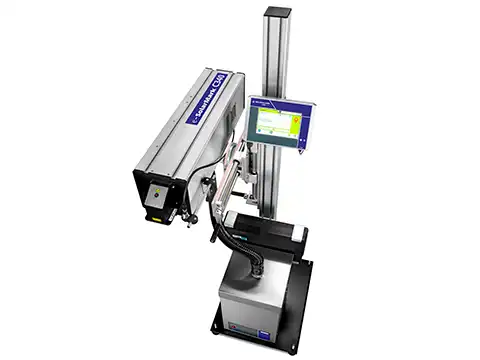
e-SolarMark C340
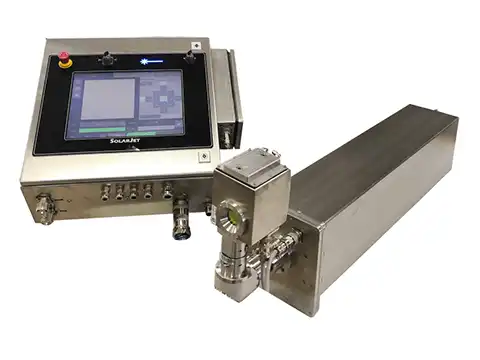
SolarJet HDM
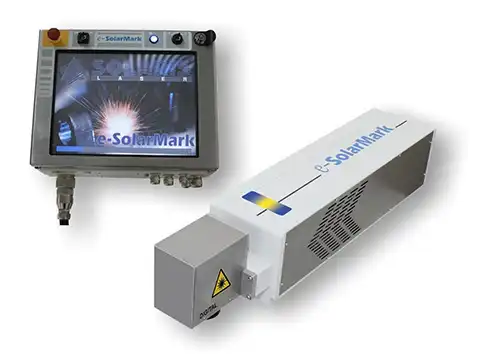
e-SolarMark+
Perfect codes with CO2 laser markers
Solaris Laser has spent decades innovating in CO2 laser technology to offer the highest-quality products for the most demanding requirements. CO2 laser markers are at the heart of FMCG and other industrial production, dependent on precision and permanent marks that do not fade over time or with harsh environments. In the pharmaceutical industry, where legibility and accuracy are paramount, Solaris Laser CO2 lasers ensure that even the smallest characters or symbols are rendered with high clarity, including the smallest 2D codes and GS1 Digital Link. This precision reduces the risk of errors in scanning or reading and is idoneous for today’s regulatory and consumer demand for scannable codes.
CO2 laser printers operate by emitting a concentrated beam of infrared light that vaporizes the surface material of the substrate, creating a permanent mark, at high speed. This is ideal for production lines required to operate at uninterrupted, high throughput rates, for example in the beverage industry, with no need to refill or clean for consumables such as inks or ribbons. This reduces downtime and the overall Total Cost of Ownership (TCO), as well as reducing the environmental footprint of the manufacturing process. From an economic perspective, Solaris Laser CO2 laser machines are also low-maintenance, with long operational lifespans, which further contributes to cost savings over time.
Furthermore, Solaris Laser ink-free CO2 laser printers generate less waste than traditional printing methods and, because of their absence of chemical-based inks, there are no harmful emissions, contributing to a safer and more sustainable production environment.
Highly versatile and easy-to-integrate
Another significant advantage of Solaris Laser CO2 laser machines is their versatility across a wide range of materials, including plastics, paper and paperboard, glass, wood, ceramics, and metals. This ensures their suitability for diverse industries, from food and beverage to electronics and automotive manufacturing.
In the FMCG sector, packaging materials vary widely depending on the product. For instance, food products may be packaged in plastic, glass, or paperboard of varied compositions, while cosmetics might use more luxurious materials like glass or coated metals. CO2 laser printers can adapt to these different materials, ensuring consistent marking quality regardless of the substrate. This adaptability is particularly advantageous in industries where product lines frequently change, as CO2 laser markers can be used across multiple applications without the need for significant adjustments or retooling.
Unlike traditional inkjet printing, which can fade or smudge over time, CO2 laser machine codes are resistant to abrasion, chemicals, and environmental factors. This permanence ensures that critical information, such as expiration dates or serial numbers, remains intact throughout the product's lifecycle and that Solaris Laser CO2 laser machines are ideal for industrial processes like sterilization, exposure to heat, or chemical treatments. This durability not only ensures compliance with regulatory standards but also enhances brand integrity by maintaining the visibility of logos and other brand identifiers.
The integration of our CO2 laser markers with automation systems and Industry 4.0 architecture is another advantage with their easy incorporation into automated production lines, where they can be controlled and monitored through ERP and MES systems. This integration enables real-time adjustments, enhances traceability, and ensures consistent marking quality across all products.
This includes seamless integration with IoT (Internet of Things) devices, enabling data collection and analysis for continuous improvement. This connectivity allows manufacturers to monitor the performance of CO2 laser machines, predict maintenance needs, and optimize production processes based on real-time data.
